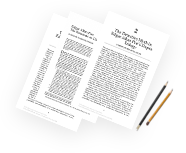Based on your reading of the articles from Units 1 and 2, determine what constitutes the fundamental issues and challenges facing women in distance education, whether they be learners, teachers, or administrators.
The essay will present your synthesis of the issues arising from the articles in the first two units. Organize it in whatever way works for you, given your own background, experiences, and needs. You may integrate ideas from readings outside the course materials, but extra readings are not required. Cite your sources appropriately, using APA style.
Feel free to write in the personal, first-person voice (e.g., ‘‘I think” or “I have noticed”) or in the more academic, third person style. As you write your essay, keep in mind how your instructor will mark the assignment. This is set out in the Assessment Section.
It is not easy to write a short summary or synthesis document, but the aim here is to crystallize your thoughts on these issues, not to report all the details.
Readings from Unit 1 & 2
Morris, M. (2006, November). New federal policies affecting women’s equality: Reality check. Canadian Research Institute for the Advancement of Women (CRIAW), 8, 1-8.
Bailey, B., Leo-Rhynie, E., & Morris, J. (1996). Why theory? In Commonwealth of Learning (Eds.), Theoretical perspectives on gender and development (pp. 1-18). Vancouver, BC: Commonweal`th of Learning.
Reddock, R. (1996). Why gender? Why development? In Commonwealth of Learning (Eds.),Theoretical perspectives on gender and development (pp. 19-44). Vancouver, BC: Commonwealth of Learning.
Tisdell, E. J. (1998). Poststructural feminist pedagogies: The possibilities and limitations of feminist emancipatory adult learning theory and practice. Adult Education Quarterly, 48(3),139-156.
Fraser, J. M. (2002). Talking relevance: Reconceiving feminist theory and pedagogy. Guidance & Counselling, 17(4), 124-128.
Furst-Bowe, J. & Dittman, W. (2001). Identifying the needs of adult women in distance learning programs. International Journal of Instructional Media, 28(4), 405-413.
Gouthro, P. (2005). A critical feminist analysis of the homeplace as learning site: Expanding the discourse of lifelong learning to consider adult women learners. International Journal of Lifelong Education, 24(1), 5-19.
Price, L. (2006). Gender differences and similarities in online courses: Challenging stereotypical views of women. Journal of Computer Assisted Learning, 22(5), 349-359.
Shumake, J. L. (2002). Reconceptualizing communication and rhetoric from a feminist perspective. Guidance & Counselling, 17(4), 99-104.
Stalker, J. (2001). Misogyny, women, and obstacles to tertiary education: A vile situation. Adult Education Quarterly, 51(4), 288-305.
Vaskovics, C., & Smith, F. L. (2015). Women and distance education in developing countries: The challenges. International Women Online Journal of Distance Education, 4(2).
Vaskovics, C., & Smith, F. L. (2015). Canada – Inclusive distance education: Experiences of four Canadian women. International Women Online Journal of Distance Education, 4(3).
Click here to request for this assignment help
#MDDE #Assignment #Integration #Essay




